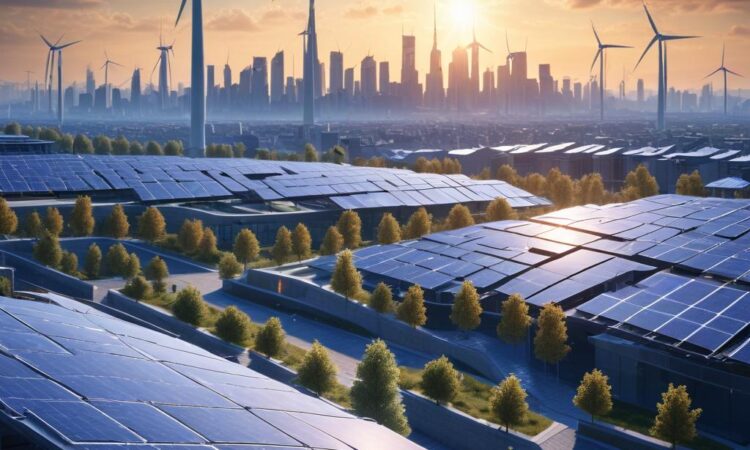Sustainable Tech: Focus on sustainability is driving innovation in green technology, renewable energy, and responsible AI development.
The world is facing a climate crisis, and the need for sustainable solutions has never been greater. Fortunately, technology is playing an increasingly vital role in addressing this challenge. This article will explore the burgeoning field of sustainable technology, examining how innovation is driving advancements in green technology, renewable energy, and responsible AI development.
Green Technology: Transforming Industries for a Sustainable Future
Green technology encompasses a wide range of innovations designed to minimize environmental impact while maximizing efficiency. This includes advancements in energy generation, transportation, manufacturing, and waste management. Here are some key areas of focus:
1. Renewable Energy Sources: Powering the Future with Nature
Renewable energy sources, such as solar, wind, hydro, geothermal, and biomass, offer a clean and sustainable alternative to fossil fuels. Technological breakthroughs are constantly improving the efficiency and affordability of these energy sources. For instance, advancements in solar panel technology have led to increased energy conversion rates, while wind turbine designs are becoming more efficient and quieter. These advancements are driving a global shift towards a cleaner energy future.
2. Energy Efficiency: Conserving Resources and Reducing Costs
Energy efficiency technologies focus on reducing energy consumption without compromising performance. This includes advancements in building design, appliance efficiency, and industrial processes. Smart grids, for example, enable real-time monitoring and optimization of energy distribution, reducing waste and improving reliability. These advancements not only contribute to environmental sustainability but also deliver economic benefits by lowering energy costs.
3. Sustainable Materials and Manufacturing: Reducing Environmental Footprint
The manufacturing industry is a major contributor to environmental pollution. Green technology is playing a crucial role in developing sustainable materials and manufacturing processes. Bio-based materials, for example, are derived from renewable resources, reducing reliance on fossil fuels and minimizing waste. Advancements in 3D printing technology are enabling the creation of customized products with minimal material waste. These innovations are transforming manufacturing from a polluter into a force for sustainability.
Renewable Energy: Unlocking the Power of Nature
Renewable energy sources are rapidly gaining ground as the world strives to reduce reliance on fossil fuels. This section explores the latest advancements in renewable energy technologies:
1. Solar Energy: Harnessing the Sun’s Power
Solar energy is one of the most abundant and readily available renewable energy sources. Technological advancements in solar panels, including increased efficiency and reduced manufacturing costs, have made solar power increasingly competitive with traditional energy sources. Innovative solar technologies, such as concentrated solar power (CSP) plants, are capable of generating electricity on a large scale, providing a reliable source of clean energy.
2. Wind Energy: Powering the Future with the Wind
Wind energy is another rapidly growing renewable energy source. Advancements in wind turbine design have led to larger, more efficient turbines capable of generating more power with less environmental impact. Offshore wind farms, located in deep water, offer vast potential for generating large amounts of clean energy. These developments are making wind energy a increasingly important part of the global energy mix.
3. Hydropower: Utilizing the Flow of Water
Hydropower, harnessing the energy of flowing water, has long been a reliable source of renewable energy. Modern hydropower plants are more efficient and environmentally friendly, utilizing advanced technologies to minimize environmental impact. Innovative technologies, such as pumped hydro storage, enable the storage of excess energy, providing a reliable backup for intermittent renewable sources like solar and wind.
4. Geothermal Energy: Tapping into the Earth’s Heat
Geothermal energy utilizes the heat from the Earth’s interior to generate electricity. Technological advancements in geothermal power plants have increased efficiency and reduced costs, making geothermal energy a viable source of clean energy. Innovative technologies, such as Enhanced Geothermal Systems (EGS), enable the extraction of heat from deeper underground, expanding the potential of geothermal energy.
Responsible AI Development: Harnessing Technology for Good
Artificial intelligence (AI) is a powerful tool with the potential to drive positive change, but it also presents significant challenges related to ethics, privacy, and sustainability. Responsible AI development focuses on mitigating these risks and ensuring that AI is used for good.
1. Ethical AI: Building Trust and Transparency
Ethical AI development prioritizes fairness, accountability, and transparency. This involves ensuring that AI algorithms are free from bias, that decisions made by AI systems can be explained, and that data privacy is protected. By addressing these ethical concerns, responsible AI development builds trust in AI and promotes its adoption for positive societal impact.
2. Sustainable AI: Reducing Environmental Impact
AI algorithms are computationally intensive, requiring significant energy resources. Sustainable AI development focuses on reducing the environmental impact of AI by optimizing algorithms for energy efficiency and reducing data storage requirements. Advancements in hardware and software are making AI more energy-efficient, enabling the development of sustainable AI solutions.
3. AI for Sustainability: Solving Global Challenges
AI is being applied to address a wide range of sustainability challenges. For example, AI-powered systems can be used to monitor deforestation, optimize energy grids, and develop sustainable agricultural practices. By leveraging the power of AI, we can accelerate progress towards a more sustainable future.
Conclusion: Embracing Sustainability Through Innovation
The convergence of technology and sustainability is driving a wave of innovation that is transforming industries and addressing global challenges. Green technology, renewable energy, and responsible AI development are leading the charge towards a more sustainable future. By embracing these innovations, we can create a world where technology is a force for good, protecting our planet and ensuring a prosperous future for all.

